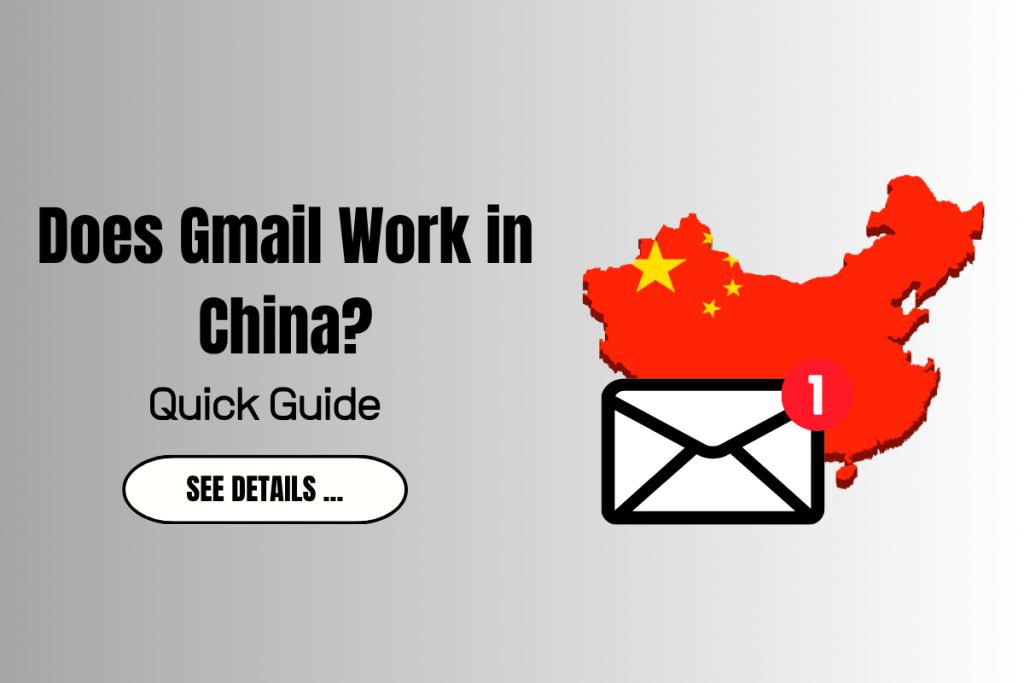No, Gmail does not work in China. The Chinese government has completely blocked all Google services, including Gmail, as part of its internet censorship system known as the Great Firewall. This means you cannot access Gmail through websites, mobile apps, or email clients while using Chinese networks without special tools. The block affects everyone in China regardless of nationality or the device you’re using.

I. Can you use gmail in China?
No, Gmail has been blocked in China by the Great Firewall since December 2014, but several reliable workarounds exist.
The Gmail block affects everyone in China:
- Tourists trying to access travel confirmations
- Business travelers needing work communications
- Expats requiring daily email access
- Students keeping up with university correspondence
II. Why Is Gmail Blocked in China?
China’s internet censorship serves several strategic purposes:
- Information control: Limiting access to platforms that can’t be monitored or censored by Chinese authorities
- National security: Preventing foreign surveillance and data collection from international companies
- Digital sovereignty: Reducing dependence on foreign technology companies
- Economic protection: Creating space for domestic alternatives to flourish
This strategy has successfully promoted Chinese alternatives like WeChat, Baidu, and QQ Mail, which now dominate the domestic market while operating under Chinese regulatory oversight.
III. What happens if you try to Access Gmail in China without a VPN?
When you try to access Gmail in China without a VPN or other bypass methods, you’ll experience these specific issues:
- The Gmail website won’t load – If you type mail.google.com in your browser, the page will time out or show an error message
- Gmail apps can’t connect – The Gmail app on your phone will fail to sync, showing connection errors
- Google services stop working – Other Google services like Google Drive or Google Photos also can’t access your account
For example, if you use the iPhone Mail app, you might see “New message from [sender]” appear as a notification, but when you open the app, it will spin endlessly trying to download the actual email content.
Without proper preparation before your trip, you could lose access to important emails, documents, and contacts stored in your Google account while in China.
IV. What Are the Workarounds to Use Gmail in China?
Despite China’s blocking of Gmail since 2014, several reliable workarounds exist to access your emails while visiting the country. Here are the most effective methods that travelers and expats use to bypass the Great Firewall.
1. Use a VPN (Virtual Private Network)
A Virtual Private Network (VPN) creates an encrypted connection to servers outside China, making it appear as if you’re browsing from another country. This effectively bypasses the Great Firewall, allowing access to Gmail and other blocked services.
Not all VPNs work in China, as the government actively blocks many VPN providers. Based on recent testing and user reviews, these VPNs consistently work in China:
- ExpressVPN: Best overall performance with servers optimized for China, works on all devices, and offers excellent speeds
- Private Internet Access (PIA): Supports Shadowsocks protocol and TCP port 443 connections that are harder to block
- PrivateVPN: User-friendly interface with a dedicated “Stealth Mode” designed specifically for China
Important: Download and set up your VPN before arriving in China, as VPN websites themselves are blocked. Many providers offer “mirror links” that may still be accessible within China if needed.
2. Use an eSIM with Built-In VPN
A newer and often more convenient solution is using a specialized China eSIM with built-in VPN capabilities. ChinaeSIM delivers convenient mobile data solutions for travelers visiting China, with all plans offering access to blocked websites without requiring a separate VPN.
- The premium Unlimited Data China eSIM begins at $13.90, perfect for heavy internet users who need unrestricted access to services like Google, WhatsApp, and social media platforms.
- Visitors on brief trips appreciate the affordable 5-Day China eSIM starting at only $7.00, which has earned excellent feedback from 21 travelers for its reliability and value.
- For medium-length stays, the popular 10-Day China eSIM plan starts from $7.90 and has received 28 positive reviews from tourists and business travelers alike.
- Regional travelers can opt for the versatile Greater China eSIM, offering coverage across mainland China and neighboring territories with validity options from 5 to 30 days.
What makes these eSIMs especially useful is their simplicity – they’re ready to use immediately via a simple QR code activation with no technical configuration required. The VPN functionality works automatically in the background, providing stable access to Gmail, Google Search, Maps, and other blocked services while being compatible with most modern smartphones.
V. FAQs
Is using Gmail in China legal?
Yes. Using Gmail itself is legal in China, but access is technically blocked. Chinese citizens and foreigners can legally use Gmail if they have the means to access it, but the government makes this deliberately difficult through technical barriers.
Will Gmail sync offline emails?
Yes. If you configure Gmail for offline access before entering China, you can read previously downloaded emails without the internet. However, you’ll need a VPN connection to send replies or receive new messages once in China.
Can I set Gmail to forward to another email?
Yes. Setting up email forwarding from Gmail to an unblocked service (like Outlook.com or QQ Mail) before your trip is an effective workaround. You’ll receive all incoming Gmail messages at your alternative email address that works in China.